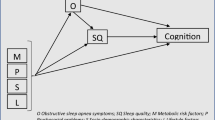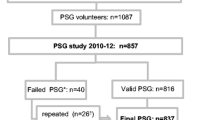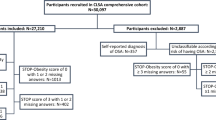Abstract
Purpose
Obstructive sleep apnea syndrome (OSAS) has a higher prevalence in postmenopausal women who are not on hormone replacement therapy (HRT), as compared to premenopausal women. Cognitive impairment (CI) is associated with OSAS and the early postmenopausal state. We hypothesized that compared to postmenopausal women at low risk for OSAS, postmenopausal women at high risk for OSAS would report worse cognitive function.
Methods
Early postmenopausal women not on HRT between the ages of 45 and 60 years, within 5 years of natural menopause, were enrolled. Participants completed a REDCap survey which collected information on demographics and risk factors, Berlin questionnaire to screen subjects for OSAS risk, and the Mail-In Cognitive Function Screening Instrument (MCFSI) score which was used to assess CI.
Results
Of 381 respondents, 127 were omitted due to missing/duplicate data or not meeting inclusion criteria. One hundred fifty-four women were classified as high risk for OSAS (OSAS+), and 100 were classified as low risk for OSAS (OSAS−). OSAS− women reported lifetime smoking, lifetime drinking, and recreational drug use more often than OSAS+ women, while OSAS+ women reported a depression diagnosis more often. The mean MCFSI score in the OSAS+ group was significantly higher (worse cognition) than in the OSAS− group after controlling for covariates (5.59, 95 % CI 5.08–6.11 vs. 4.29, 95 % CI 3.64–4.93, p < 0.05).
Conclusion
Early postmenopausal women at high risk for OSAS report more CI than those at low risk for OSAS. Future studies should identify biomarkers of this CI and define the degree of reversibility of CI with OSAS treatment.


Similar content being viewed by others
Abbreviations
- OSAS:
-
Obstructive sleep apnea syndrome
- HRT:
-
Hormone replacement therapy
- CI:
-
Cognitive impairment
- AD:
-
Alzheimer’s disease
- AHI:
-
Apnea-hypopnea index
- MCFSI:
-
Mail-in Cognitive Function Screening Instrument
- MUSC:
-
Medical University of South Carolina
- BQ:
-
Berlin questionnaire
- ANCOVA:
-
Analysis of covariance
- CPAP:
-
Continuous positive airway pressure
References
Bixler EO, Vgontzas AN, Lin HM, Ten Have T, Rein J, Vela-Bueno A, Kales A (2001) Prevalence of sleep-disordered breathing in women: effects of gender. Am J Respir Crit Care Med 163(3 Pt 1):608–613
Saaresranta T, Polo O (2002) Hormones and breathing. Chest 122(6):2165–2182
Fava C, Montagnana M, Favaloro EJ, Guidi GC, Lippi G (2011) Obstructive sleep apnea syndrome and cardiovascular diseases. Semin Thromb Hemost 37(3):280–297. doi:10.1055/s-0031-1273092
Ahn SH, Kim JH, Kim DU, Choo IS, Lee HJ, Kim HW (2013) Interaction between sleep-disordered breathing and acute ischemic stroke. J Clin Neurol 9(1):9–13. doi:10.3988/jcn.2013.9.1.9
Fusetti M, Fioretti AB, Valenti M, Masedu F, Lauriello M, Pagliarella M (2012) Cardiovascular and metabolic comorbidities in patients with obstructive sleep apnoea syndrome. Acta Otorhinolaryngol Ital 32(5):320–325
Lal C, Strange C, Bachman D (2012) Neurocognitive impairment in obstructive sleep apnea. Chest 141(6):1601–1610. doi:10.1378/chest.11-2214
Weber MT, Rubin LH, Maki PM (2013) Cognition in perimenopause: the effect of transition stage. Menopause. doi:10.1097/gme.0b013e31827655e5
Henderson VW (2008) Cognitive changes after menopause: influence of estrogen. Clin Obstet Gynecol 51(3):618–626. doi:10.1097/GRF.0b013e318180ba10
Bagger YZ, Tanko LB, Alexandersen P, Qin G, Christiansen C (2005) Early postmenopausal hormone therapy may prevent cognitive impairment later in life. Menopause 12(1):12–17
Magnusson C, Baron JA, Correia N, Bergstrom R, Adami HO, Persson I (1999) Breast-cancer risk following long-term oestrogen- and oestrogen-progestin-replacement therapy. Int J Cancer 81(3):339–344
Grady D, Wenger NK, Herrington D, Khan S, Furberg C, Hunninghake D, Vittinghoff E, Hulley S (2000) Postmenopausal hormone therapy increases risk for venous thromboembolic disease. The Heart and Estrogen/progestin Replacement Study. Ann Intern Med 132(9):689–696
Yaffe K, Laffan AM, Harrison SL, Redline S, Spira AP, Ensrud KE, Ancoli-Israel S, Stone KL (2011) Sleep-disordered breathing, hypoxia, and risk of mild cognitive impairment and dementia in older women. JAMA 306(6):613–619. doi:10.1001/jama.2011.1115
Ancoli-Israel S, Palmer BW, Cooke JR, Corey-Bloom J, Fiorentino L, Natarajan L, Liu L, Ayalon L, He F, Loredo JS (2008) Cognitive effects of treating obstructive sleep apnea in Alzheimer’s disease: a randomized controlled study. J Am Geriatr Soc 56(11):2076–2081. doi:10.1111/j.1532-5415.2008.01934.x
Quintana-Gallego E, Carmona-Bernal C, Capote F, Sanchez-Armengol A, Botebol-Benhamou G, Polo-Padillo J, Castillo-Gomez J (2004) Gender differences in obstructive sleep apnea syndrome: a clinical study of 1166 patients. Respir Med 98(10):984–989
Macey PM, Kumar R, Yan-Go FL, Woo MA, Harper RM (2012) Sex differences in white matter alterations accompanying obstructive sleep apnea. Sleep 35(12):1603–1613. doi:10.5665/sleep.2228
Quan SF, Chan CS, Dement WC, Gevins A, Goodwin JL, Gottlieb DJ, Green S, Guilleminault C, Hirshkowitz M, Hyde PR, Kay GG, Leary EB, Nichols DA, Schweitzer PK, Simon RD, Walsh JK, Kushida CA (2011) The association between obstructive sleep apnea and neurocognitive performance—the Apnea Positive Pressure Long-term Efficacy Study (APPLES). Sleep 34(3):303B–314B
Harris PA, Taylor R, Thielke R, Payne J, Gonzalez N, Conde JG (2009) Research electronic data capture (REDCap)—a metadata-driven methodology and workflow process for providing translational research informatics support. J Biomed Inform 42(2):377–381. doi:10.1016/j.jbi.2008.08.010
Netzer NC, Stoohs RA, Netzer CM, Clark K, Strohl KP (1999) Using the Berlin Questionnaire to identify patients at risk for the sleep apnea syndrome. Ann Intern Med 131(7):485–491
Walsh SP, Raman R, Jones KB, Aisen PS (2006) ADCS prevention instrument project: the Mail-In Cognitive Function Screening Instrument (MCFSI). Alzheimer Dis Assoc Disord 20(4 Suppl 3):S170–S178. doi:10.1097/01.wad.0000213879.55547.57
Ferini-Strambi L, Baietto C, Di Gioia MR, Castaldi P, Castronovo C, Zucconi M, Cappa SF (2003) Cognitive dysfunction in patients with obstructive sleep apnea (OSA): partial reversibility after continuous positive airway pressure (CPAP). Brain Res Bull 61(1):87–92
Lavie L, Vishnevsky A, Lavie P (2004) Evidence for lipid peroxidation in obstructive sleep apnea. Sleep 27(1):123–128
Spira AP, Blackwell T, Stone KL, Redline S, Cauley JA, Ancoli-Israel S, Yaffe K (2008) Sleep-disordered breathing and cognition in older women. J Am Geriatr Soc 56(1):45–50. doi:10.1111/j.1532-5415.2007.01506.x
Morrell MJ, McRobbie DW, Quest RA, Cummin AR, Ghiassi R, Corfield DR (2003) Changes in brain morphology associated with obstructive sleep apnea. Sleep Med 4(5):451–454
Gold EB, Sternfeld B, Kelsey JL, Brown C, Mouton C, Reame N, Salamone L, Stellato R (2000) Relation of demographic and lifestyle factors to symptoms in a multi-racial/ethnic population of women 40–55 years of age. Am J Epidemiol 152(5):463–473
Bade BC, Strange C, Lal C (2014) Effect of obstructive sleep apnea treatment on mail-in cognitive function screening instrument. Am J Med Sci 348(3):215–218. doi:10.1097/MAJ.0000000000000233
Komori T, Eguchi K, Saito T, Nishimura Y, Hoshide S, Kario K (2015) Riser blood pressure pattern is associated with mild cognitive impairment in heart failure patients. Am J Hypertens. doi:10.1093/ajh/hpv086
Kivipelto M, Ngandu T, Fratiglioni L, Viitanen M, Kareholt I, Winblad B, Helkala EL, Tuomilehto J, Soininen H, Nissinen A (2005) Obesity and vascular risk factors at midlife and the risk of dementia and Alzheimer disease. Arch Neurol 62(10):1556–1560. doi:10.1001/archneur.62.10.1556
Dancey DR, Hanly PJ, Soong C, Lee B, Hoffstein V (2001) Impact of menopause on the prevalence and severity of sleep apnea. Chest 120(1):151–155
Resta O, Bonfitto P, Sabato R, De Pergola G, Barbaro MP (2004) Prevalence of obstructive sleep apnoea in a sample of obese women: effect of menopause. Diabetes Nutr Metab 17(5):296–303
Funding source
This work was done with funding provided by National Institute on Drug Abuse, P50 DA106511-14, “Specialized Centers of Research (SCOR) on Sex Differences” (K. Brady, PI).
Compliance with ethical standards
This study was conducted in accordance with the amended Declaration of Helsinki. The local institutional review board (IRB) at the Medical University of South Carolina (MUSC) approved the study protocol, PRO # Pro00025410. Waiver of written informed consent was obtained from the IRB for this survey-based study. Data was collected between the dates of 07/2013 to 06/2015.
Conflict of interest
Dr. Lal has received grant funding from Invado Pharmaceuticals and the Specialized Center of Research (SCOR) on Sex and Gender Factors Affecting Women’s Health at the Medical University of South Carolina and is a consultant for Ikaria Pharmaceuticals. Dr. Joseph, Ms. Dibartolo and Dr. Kumbhare and Dr. Strange do not have any conflicts of interest to disclose on the subject matter or materials discussed in this manuscript.
Author information
Authors and Affiliations
Corresponding author
Rights and permissions
About this article
Cite this article
Lal, C., DiBartolo, M.M., Kumbhare, S. et al. Impact of obstructive sleep apnea syndrome on cognition in early postmenopausal women. Sleep Breath 20, 621–626 (2016). https://doi.org/10.1007/s11325-015-1261-4
Received:
Revised:
Accepted:
Published:
Issue Date:
DOI: https://doi.org/10.1007/s11325-015-1261-4




